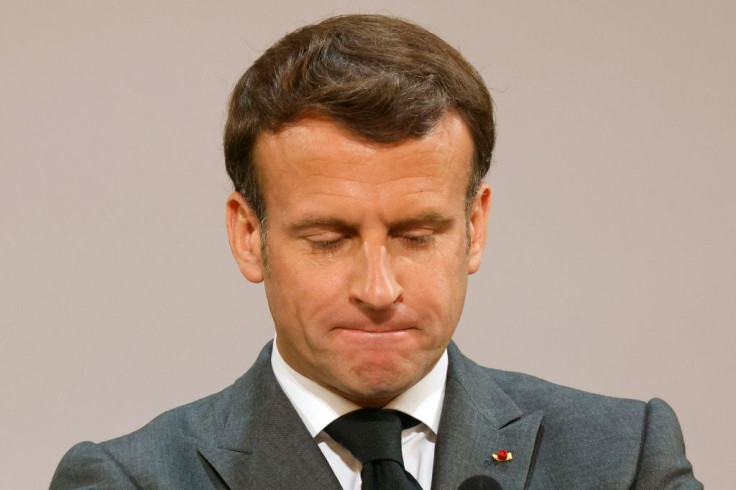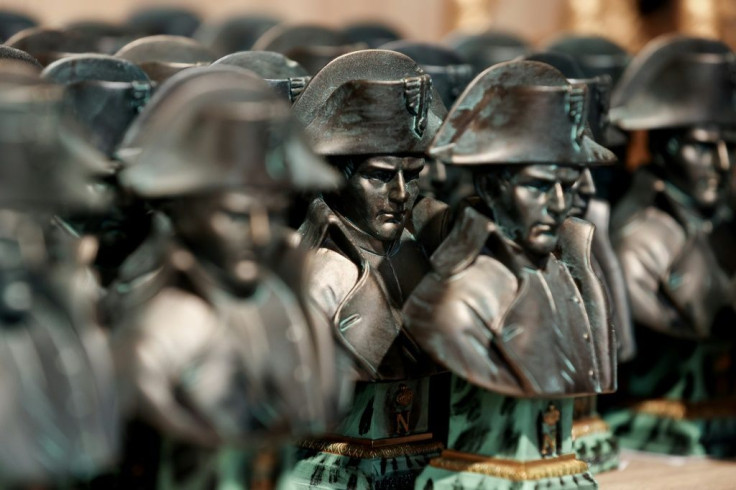Macron Walks Tightrope With Napoleon Commemoration
French President Emmanuel Macron is to lay a wreath at the tomb of Napoleon Bonaparte to mark the 200th anniversary of his death on Wednesday after months of debate about the legacy of the country's most famous autocrat.
Macron waited until the last minute to announce his plans for the tricky bicentenary and is seeking to walk a middle path between those who wanted a celebration, and others who called for a boycott.
The famed Corsican is one of the most divisive figures in French history, his huge contribution to the creation of the modern state set against his imperialism and war-mongering.
But in the wake of the Black Lives Matter movement and the emergence of a new generation of vocal anti-racism campaigners in France, Napoleon's decision to re-establish slavery in 1802 has been the focus of debate.

"It will be a commemoration, not a celebration," an aide to the French president told reporters on Monday, adding that the day's ceremonies would include a wreath-laying and a speech.
Macron has criticised recent attempts to topple statues of French figures involved in slavery, and he has condemned so-called "cancel culture" as an attempt to "erase what we are".
"Our approach is to look at history in the face," the presidential aide said, adding that the approach meant "neither denial, nor repentance".
Macron believed it was wrong to judge figures of the past by today's ethical standards, the aide added.
"Someone at the start of the 21st century does not think like someone at the start of the 19th century," he said. "Our history is our history and we accept it."

But in a speech at the Institut de France, one of many Napoleonic institutions, the French president will condemn slavery as "an abomination, including in the context of the era," the aide said.
The 43-year-old president, elected as France's youngest leader since Napoleon, will also dwell on his lasting impact on the state bureaucracy, as well as the school and legal systems.
Napoleon seized power in a coup in 1799, overthrowing France's first republic that was established in the wake of the 1789 revolution that abolished the monarchy.

Renowned for his military prowess, he clocked up a series of victories, including at the Battle of Austerlitz, which resulted in a French empire dominating most of continental Europe.
But as well as crowning himself emperor and crushing the fledgling attempts at democracy at home, Napoleon also reversed gains for women and the ban on slavery introduced under the first republic.
Slavery was re-established in French colonies, a move seen by some as being motivated by a desire to dominate the Caribbean sugar trade in the face of competition from arch-enemy England.
Mathilde Larrere, a French historian, believes there was a "racist dimension" to the decision, however.
Writing in The New York Times recently, American scholar Marlene Daut called Napoleon "France's biggest tyrant" and "an icon of white supremacy" in a column that condemned planned commemorations in France.
In the build-up to the bicentenary of Napoleon's death on the island of Saint Helena, some 160 French institutions from schools to museums have signed up for events grouped under the "Annee Napoleon 2021" label.
Though many of those events have been hit by the coronavirus pandemic, French TV schedules have been saturated with new documentaries and libraries are stocked with new books looking at every aspect of his life.
"Why shouldn't we celebrate Napoleon?" far-right nationalist leader Marine Le Pen told France Inter radio on Tuesday. "He's a huge historical figure. I regret that the president is commemorating him in a hurry.
"He did so much for the country, and he gave so much to the world."
Left-wingers have urged Macron to avoid the occasion.
"The Republic should not pay an official homage to the person who buried the first republican experience of our history by installing an authoritarian regime," left-winger Alexis Corbiere wrote in Le Figaro newspaper in March.
Other French leaders have also had to contend with how to remember the man known as the "little corporal", famed for his frock coat and "bicorne" (two-cornered) hat which he wore sideways on the battlefield.
In 2005, late president Jacques Chirac refused to attend the 200th anniversary of the Battle of Austerlitz, which saw Napoleon defeat larger Russian and Austrian forces.
© Copyright AFP {{Year}}. All rights reserved.





















